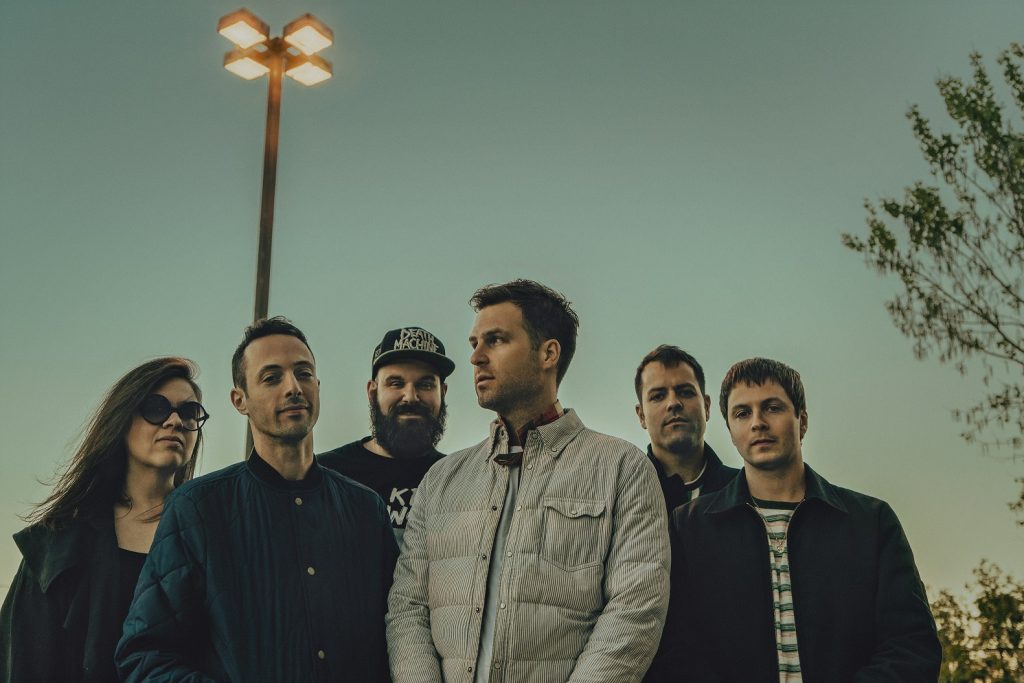
Fucked Up is a lot. Like a lot a lot. But in a really good way. To listen to a Fucked Up album is to bounce across a ton of different genres and sounds while still retaining a punk/hardcore center. The Toronto sextet have been releasing ripping, thoughtful albums for over a decade now and they show no sign of slowing down.
They recently released their new LP, Dose Your Dreams, and it is the perfect encapsulation of everything Fucked Up is. They have a prog rock sensibility for adding textures and sounds to a dense central narrative. Damian Abraham’s ferocious vocals elevate the proceedings to a ferocious pace. It would take a lot longer than a few introductory paragraphs to unpack everything that Dose Your Dreams is, so do yourself a favor and listen to it while reading this interview and enjoy a sensory adventure.
We caught up with Fucked Up architect and guitarist Mike Haliechuck as the band heads out to tour their new album. We discussed the making of Dose Your Dreams, how the band handles so many disparate sounds, and got insights into their creative process.
Allston Pudding: How have the last few weeks been with the release of the album and now the tour getting underway?
Mike Haliechuck: We did a few test shows and they went pretty well. Some of the songs are a bit of a stretch for us on the new record, but they have been sounding good, I think.
AP: How much planning and prep went into getting the new songs ready to play the songs live?
MH: We practiced for like a week and played a show, and then did a bit more this week. Some shit is coming out of a sampler now so its tricky, but our show is meant to be a bit loose and chaotic I think, so it’s ok.
AP: What was your favorite part of working on Dose Your Dreams?
MH: I like the part between a song being there but unformed, and when it clicks and you know what it will be. When the song develops its emergent quality and you know you have something you can use that will be special rather than just a piece of music that sounds cool. It’s a great feeling that keeps me going back.
AP: The band has so many different styles and influences; if someone asks you to describe the type of music you play, what do you say?
MH: Punk.
AP: What’s your process like when getting underway for a new album, what comes first, music or lyrics?
MH: Always music. This time we had a lot of music done for a year before I started to tackle the words. We don’t use a lot of vocal melodies, so the lyrics come into fully-formed songs for the most part, and then Damian carves out a spot for himself.
AP: Are you ever thinking about the flow of the album as you create it. Do you ever think, ‘Oh we need this type of song here to balance things out?’
At a certain point yes, especially on this record. We wrote like mad and came up with 40 or 50 songs and then once you’ve done the work of building the bricks, you start to think about what order they should all be stacked in.
AP: Most bands are generally pretty consistent in their sound–but with you sometimes it seems like you’re listening to a different band from song to song, in an amazing way. How do you manage all of the disparate sounds you have and blend them to create a cohesive album?
We like different styles of music and have been a band for so long that it’s boring to just write the same stuff again and again, and also hard. A few years ago I sat down and tried to come up with a riff like the intro to “Son the Father,” and couldn’t come up with anything good. You just have to keep moving forward in life or it will be inauthentic. I don’t think there’s anything weird about having different styles on a long statement album.
AP: How do you compose such varied and multi-layered tracks? What does your studio time look like: are you entering fully prepared to rip through a scheduled session, or is there more improvisation among the group?
MH: It’s like 15% tracking and 85% production. Most of the songs this time were even arranged in Pro Tools. But this time we didn’t have anything written before hand–we wrote everything on the spot as we were recording it, and putting it all together in the box.
AP: Similarly, what’s the editing/production side look like? Are you looking to hit certain marks and tweaking the track for that, or does the production discover new paths for a song?
MH: It’s all the same thing. We aren’t virtuoso players and we don’t rely much on vibe or group cohesion, so most of everything comes together on the file. If a verse needs to be longer, we copy verse bars and place them where we need. We make the skeleton of every song this way, and then record over it and keep going.
AP: What are the discussions like when you’re talking about how to compose a track? Is there ever a moment where you say “no, that’s too weird”?
MH: Its more like ‘that doesn’t sound good.’ We came up with some songs that were all cello and opera-vocal arrangements. If it had sounded amazing, it would have made it onto the album somehow, but it didn’t really sound that great. We also came up with a lot of dance-y music, but all the tracks other than the title track were just a bit flat.
Fucked Up plays at Brighton Music Hall on 11/6, get tickets here.
